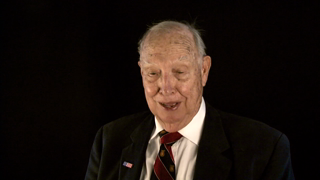7:11 | Before they moved out for the day, platoon leader Charles Shepherd made a startling prediction to his men. As they advanced, he broke with protocol and moved to the front of the column. Soon, they were under German fire and ordered to pull back to make way for an artillery barrage. He started a peel-back maneuver to get everyone back to shelter in a ditch, but when it was his turn, there was no one left to cover him. This action led to him receiving the Silver Star, which he describes in another clip.
Keywords : Charles Shepherd Germany flakwagen artillery shell fragment tracer hospital doctor nurse delouse Section 8

Charles Shepherd started with ROTC because of the uniforms. There was a depression on and it was free clothing. The newly commissioned Lieutenant shipped out from Boston on June 6, 1944, arriving in Normandy as a replacement. He talked his way into the 121st Infantry Regiment, his father's outfit in World War 1.
They were green replacements in hedgerow country. Their first night there, one of them died when he went outside to answer the call of nature. No one knew him and he knew no one. Charles Shepherd recalls that sad first night at the front, where the hedgerows presented a unique battle environment.
Charles Shepherd was near Saint-Lo during the massive bombing campaign over that city. The men in his rifle platoon were baffled when strips of aluminum began falling around them and they hustled to gather them up. Later they learned what they were and how they were no danger. As they moved out, meeting no resistance, they advanced and dug in seven times in one day.
The French woman was talking and pointing to her barn. Three German soldiers were in there and they surrendered to Charles Shepherd and his platoon. Some of the German soldiers in the area were Asians captured at the Russian Front fighting for the Russian Army. The Germans pressed them into service as occupation troops in France.
They moved through a lot of small towns in France and Charles Shepherd reveals how you could tell what phase of the battle the town was in by the size of the rubble. They were pestered by German planes and instructed not to shoot at them. At one point he made eye contact with a German pilot flying low in a valley and he knows he could have shot him down.
In the fighting around the French coastal town of Saint-Malo, Charles Shepherd was constantly dodging artillery shells. At one point he was between his own mortar platoon and a German self-propelled gun. Everyone was firing and he took a shell fragment in his hand. For the moment, there was no evacuation and no morphine. They were surrounded.
Asked whether the shrapnel that hit him was from German or American ordnance, Charles Shepherd just laughs. In combat, he says, it doesn't make a difference. A chance meeting years later gave him a little insight into what happened. Evacuated to England, he faced new difficulties, like trying to get into the officer's club at the hospital.
Evacuated to England, Charles Shepherd had to undergo three operations on his hand. The third one was only necessary because the doctors bungled the second. Before he went back to his unit, he had to lead enlisted men in physical rehabilitation and then endure Christmas and New Year's Eve at a resort hotel.
Recovered from his wound, Charles Shepherd's first stop was the Fontainebleau Palace. He then rejoined his unit in the Hurtgen Forest, where the trees were devastated from the furious artillery barrages during the fighting there. They occupied a trench where they fought snow and ice more than Germans.
Moving towards Cologne, Charles Shepherd's unit had to pull back when a German 88mm gun knocked out their tanks and scattered the soldiers. He was in charge of the company for three days when the company commander was wounded. When the new captain arrived, he did not win any popularity contests.
When a soldier put a round through his hand while cleaning his .45, the company commander had a fit, accusing him of intentionally doing it. Charles Shepherd , the man's platoon leader, said no, it misfired, trying to defuse the situation. Later on in another town, during a briefing in a German cellar, the same company commander picked up a grease gun and, guess what?
Charles Shepherd sent one of his men to the rear with a captured German. He didn't return for a long time and, when he did, the explanation gave him pause. After a 72 hour pass to Paris, where the girls were glad to see him, his unit advanced to Bonn, where they occupied the Ford Motor Works. Scouts had reported a water tank and everyone was anticipating showers, but, situation normal.
Crossing the Rhine at Remagen, Charles Shepherd's unit advanced on the town of Siegen. They encountered a German flakwagen, a tracked, anti-aircraft vehicle which the enemy had lowered to fire at the Americans on the ground. The standoff lasted overnight.
The second time he was wounded, Charles Shepherd returned very quickly to his unit. He got lost driving around in Germany and then, suddenly, the war in Europe was over. Masses of German soldiers were surrendering to the Americans to avoid Russian captivity. Soon, the division was back in the States for a 30 day leave and then, the Pacific.
Charles Shepherd needed five points to be discharged at the end of the war. He pointed out to his commander that the decoration he had been recommended for was worth five points. All he had to do was round up some of the guys to confirm the story. This led to him receiving the Silver Star for a previous action.